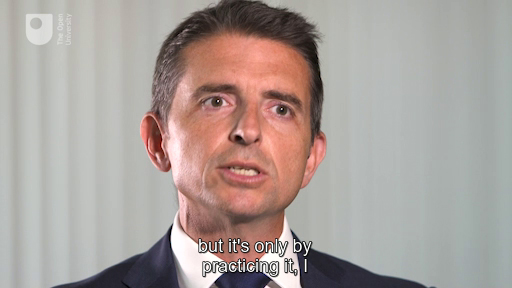1 What is leadership?
The subject of leadership is highly contested and has many different definitions: ‘There are almost as many definitions of leadership as there are persons who have attempted to define the concept’, according to Bass (1990, p. 11).
This is particularly evident when you consider that, in 2020, a Google search suggested that there are over 47 million books and articles on leadership available worldwide. The American consultant Joe Iarocci (2015) estimated that there are on average four books a day being published with the words ‘leader’ or ‘leadership’ in the title.
First, you will hear from an influential leader in the Royal Air Force (RAF) – Air Commodore Paul Godfrey. During this short video, he shares his insights about what leadership means to him. Watch it and do the first activity below. You might find it useful to make notes.

Transcript: Video 1 Air Commodore Paul Godfrey: What is leadership?
Activity 1 What makes a good leader?
- Spend 5 minutes listing the names of leaders who have influenced you. They might be famous, or someone you know personally – for example, a relative, a colleague, a former teacher, or even a friend.
- Considering this list, spend about 10 minutes noting why you believe they are great leaders. What are their practices, qualities and skills that make them stand out?
- For another few minutes, think about these qualities.
- What type of skills are they?
- Are they specific to the person you have thought of, or are they generic skills that can be learned?
- Is the person an individual leader making a difference? Or are they in an environment that brings other people together to create and achieve a shared goal?
Discussion
Leadership is subjective. If you showed this list to someone else who also knew these people, would they agree with you? While you are considering these skills and qualities, are they contextual? Maybe they are relational? How might they be interpreted by other people?
In the next actvity you will review and consider theories around leadership.
Actvity 2 Reading on current theories and research
Now read the following article and reconsider your reflections.
Leadership: Current Theories, Research, and Future Directions [Tip: hold Ctrl and click a link to open it in a new tab. (Hide tip)]
The next section will build on what you have learned about the individual leader and compare it to leadership as a collective process.
